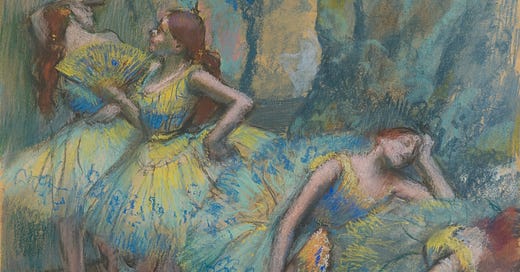Nothing Funnier Than Unhappiness: On Cycles of Absurdity
Art teaches us that we live in community. We artists are talking about change....Some people say, leave before it is too late. But I say it is time to fight for the world you want to live in.
“Nothing is funnier than unhappiness, I grant you that.”
Samuel Beckett, Endgame
Endgame is the play for our time. It is about the end of the world, where one man rules everything, although there is no apparent reason why he is obeyed. It’s a play about the absurdity of life. A play about a world ending in disaster. One man controlling the planet from his chair. Right now, it feels like a parable for our time.
When my son, Stephen, lived abroad and was home between trips, we went to sushi as a family and then to the theater. We take theater seriously in our family. When Gil Cates was at the Geffen, Steve and I went to a lot of plays, just the two of us. We loved this; Gil would chat with us after the shows. We also saw John Goodman in Cat on a Hot Tin Roof—so magnificent.
When we go as a family, we all go: my kids, my kid’s dad, his girlfriend, everyone. As a family, we’ve seen Death of a Salesman with Brian Dennehy; Annette Bening in The Cherry Orchard.
At our showing of Endgame, Barry McGovern, that great Irish actor, was playing Clov. The Irish nail Beckett every time. My kids’ dad wasn’t dating when we went to Endgame. At pre-theater sushi, Steve was in high spirits and started quoting Beckett.
“How do you know Beckett so well?” his dad asked.
“Oh, Mom was always teaching Beckett. She loves Endgame and Godot. And when I was suspended from school, I’d go along. Mom would have the students read the plays out loud. She’s big on having the play read so you can hear it.”
Last week, our family went to The Groundlings, a sketch comedy theater in the heart of West Hollywood. We saw the Sunday sketches and went to dinner. It was great being a family going to the theater together again. We haven’t done it for a bit. The pandemic threw us off our game. Some of our best family experiences have been at the theater. It takes a community to make theater. To come to the theater. To make art. To make change.
At the theater, we reflect on our humanity. We question the world we live in—and our own interpretation of the world—in a way that isn’t always asked of you when you go to the movies. Many movies are designed to entertain you, and really thoughtful ones will ask you to question something about the way you live, but a play is like entering another zeitgeist. Through the intimate performances required of plays, we see ourselves walking in the world differently. A play provokes.
Beckett explores our need as humans to be in a cycle of dominance. We look to someone to be the boss, someone to fetch and carry. Even when it doesn’t make sense anymore, we continue.
Beckett recognizes how we get caught in absurd cycles that we keep repeating. When we become paralyzed by these cycles, we can’t change the game. On a personal level, a community level, a national level, he’s right.
In the Gilded Age, at the end of the 19th century, the richest ten percent of Americans had 72% of the wealth, and the bottom forty percent had almost nothing.
In 2025, the top ten percent have 69% of the wealth, and the bottom forty percent have 2.5%.
We keep passing laws to protect the rich. We keep failing to meet the needs of everyday people. We keep targeting marginalized groups. In Becket’s theater of the absurd, we are repeating ourselves. As has been true throughout history, the majority of Americans are not safe in their own country.
We have to acknowledge the cycles that are at work. If you’ve been following the case of Kilmar Armando Abrego Garcia, the 29-year-old sheet metal worker who was wrongfully deported to Salvadorian prison, you will see that even U.S. citizenship is no longer a protection. The list of those under active threat of deportation, arrest, and oppression keeps getting wider.
Soon, it may include all of us, any of us.
In spite of the collapse of democracy, theater is making a comeback in Los Angeles in 2025. As is poetry. Art teaches us that we live in community. We artists are talking about change. We work for change. Every day, I wake up and ask myself, “How can I be a force for positive change in the world today?” Some people say, leave before it is too late. But I say it is time to fight for the world you want to live in.
First They Came by Pastor Martin Niemöller
First they came for the Communists
And I did not speak out
Because I was not a Communist
Then they came for the Socialists
And I did not speak out
Because I was not a Socialist
Then they came for the trade unionists
And I did not speak out
Because I was not a trade unionist
Then they came for the Jews
And I did not speak out
Because I was not a Jew
Then they came for me
And there was no one left
To speak out for me




So on target, Kate -- thank you. Also a Beckett fan, and Alan Mandell directed and performed best, at least here in LA. Alan studied Beckett with Beckett!
And if we leave... Where should we go? Just like the tumultuous weather we're having, politics around the world have become harsher. Does any other country really want ugly Americans right now?